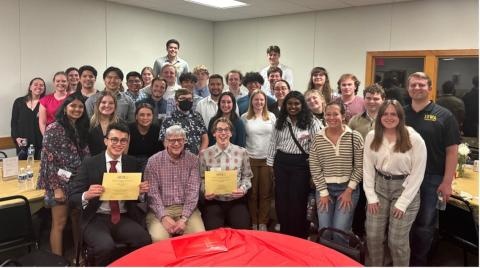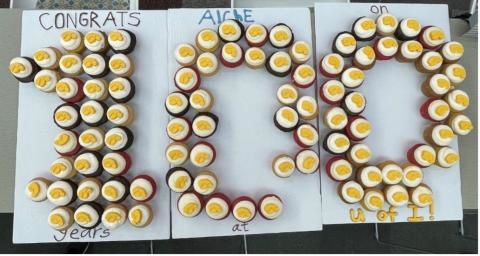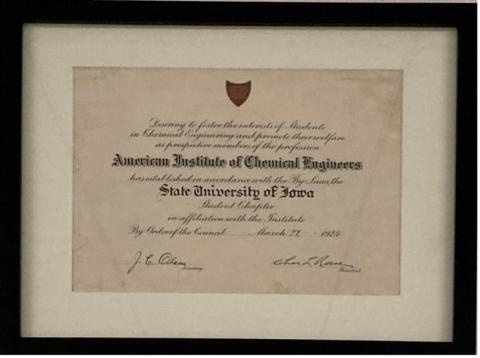Advisor's Corner
Prof. David Murhammer, Professor and AIChE Student Chapter Advisor
Greetings to Hawkeye Chemical Engineers!! This Spring 2024 issue of our AIChE Student Chapter Newsletter begins with an article about the participation of University of Iowa students at the AIChE Mid-America Regional Conference held April 5-6 at the University of Arkansas in Fayetteville, Arkansas. This is the fourth consecutive year that the University of Iowa has won the regional competition. We had three ChemE Jeopardy teams competing, one of which won the competition and qualified for the North America competition that will be held at the AIChE Annual Student Conference October 25-28 in San Diego, California. University of Iowa Students also finished 2nd and 3rd in the Student Technical Presentations Competition.
Other articles in this issue include discussions of (i) the 100th anniversary of our AIChE student chapter (The University of Iowa, then called the State University of Iowa, officially became the 6th student chapter in the United States on March 27, 2024), (ii) Tinker Process Safety Competition, (iii) Research Spotlight featuring Carlos Gutierrez’s research in Professor Stanier’s research group, (iv) attendance of students and me at the Global Congress on Process Safety (2024 AIChE Spring Meeting) held in New Orleans, Louisiana, and (v) Senior Class Future Plans.
Any comments about the newsletter should be sent to me at david-murhammer@uiowa.edu.
Spring AIChE Conference
Sydney Schulte
The 2024 AIChE Mid-American region held their annual student conference at the University of Arkansas in Fayetteville, AR from April 5th through the 6th. Thirty-six students from the University of Iowa attended the conference. They began their eight-hour drive in university vans Friday morning, participating in a scavenger hunt along the way to help pass the time. That night, the women’s basketball team played in the Final Four game at the national tournament, so the students went to a sports bar to watch the Hawks triumph.
The conference events commenced on Saturday with the Chem-E car competition followed by lunch. Colin Houts and Josiah Power gave technical presentations about their research done over their collegiate careers; they received third and second place awards, respectively. Four students (Aoife Cleary, Bram Sueppel, Klaertje Hesselink, & Liam Horan) participated in the poster presentation competition.
Iowa had three ChemE Jeopardy teams that competed, Maxwell’s Silver Hammer (Anna Stinson, Colin Houts, Josiah Power, & Liam Horan), Jacketed Cattle (Braden Jensen, Cheryl Reuben, Hallie Gates, & Rhea Fisch), and Assuming Ideality (Aoife Cleary, Caleb Coulthard, Eric Hou, & Sydney Schulte). All three teams won their first game, with Maxwell’s Silver Hammer winning the second round, advancing to the final round, and ultimately won the entire competition. Maxwell’s Silver Hammer will represent Iowa at the national conference in the fall, hoping for another national championship for the department.

The night concluded with a dinner banquet, featuring an awards ceremony and keynote speaker. This weekend was a remarkable experience, creating new connections and spending quality time with peers beyond the classroom. Students are anticipating the national conference in the fall, scheduled to be held in San Diego, California, at the end of October. This will once again be an excellent opportunity for students to create more memories and highlight the many talents we possess here at the University of Iowa.
100th Anniversary of AIChE at the University of Iowa
Cheryl Reuben
On March 28th, the student chapter of AIChE celebrated 100 years at the University of Iowa! The celebration was held in the engineering student commons with cupcakes to commemorate the occasion and was organized by the department administrator Amanda Jensen. Both students and faculty came together to enjoy the treats and mark the occasion. Speeches were given by the department chair, Dr. Jun Wang, and the president of the student chapter, Josiah Power.

The student chapter received its charter from the national AIChE organization on March 27th, 1924. The original certificate is located in the AIChE board next to the department office and is how we first noticed the 100th year anniversary was approaching. In the years since its formation, our chapter and its members have received numerous awards and accolades. At the 2023 national AIChE conference the chapter received its 19th consecutive Outstanding Student Chapter award, which is the longest active streak among student chapters, and its 30th award in the last 31 years. The ChemE Jeopardy team has also experienced much success. At the 2023 national conference the team won their 5thnational championship and will be heading to the 2024 national conference to win another.
The success of this chapter is due in no small part to our student chapter advisor, Professor David Murhammer. Professor Murhammer has been the advisor of the student chapter since 1990, which includes the full Outstanding Student Chapter streak. He has been supportive of members’ academic and professional development and has provided a solid foundation for the chapter and its board to build on.

Tinker Process Safety Competition
Liam Horan
On February 9th, seven AIChE third-year students participated in the Tinker Process Safety Competition, in which they presented their findings on in-depth research into a Chemical Safety Board (CSB) Incident. The students utilized their skills used in Dr. Murhammer’s Chemical Process Safety Class to compile a report and a poster presentation describing the sequence of events, faults, and recommendations for their selected event. The competition is held each year and is sponsored by the generous support of Iowa alumnus Sharon Tinker. Every year, the first-place submission wins $1000, the second-place winner(s) win $500, and all other participants receive $100 and a copy of Incidents that Define Process Safety by Atherton and Gil. Additionally, the winners will also receive a department-sponsored trip to the AIChE’s 2025 Spring Meeting and 21st Global Congress on Process Safety, held in Dallas, Texas.
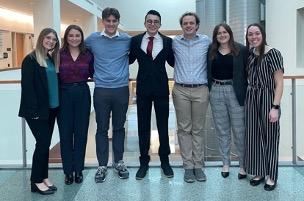
The presentations were judged by Sharon Tinker and several members of the ChemE Advisory board. After viewing all the posters, the judges met to discuss scores between the presentation and technical writing components, and winners were selected. I was awarded first place for my investigation into the Formosa Plastics Vinyl Chloride Explosion, Riley Coulter was awarded second place for her investigation into the Watson Grinding Manufacturing Co. Fatal Propylene Explosion and Fire, and Bram Sueppel was also awarded second place for his investigation into the Dillon Milling Combustible Dust Explosion.
The Formosa Plastic Vinyl Chloride Explosion occurred on April 23rd, 2024, when a large reaction mixture of chloride monomer (VCM) was released from a production unit at the Formosa Plastics plant in Illiopolis, Illinois. The VCM cloud then ignited, and the resulting explosion killed five workers and seriously injured three more. The root cause of the incident was not immediately identified, and fires burned for several days, causing an evacuation of the surrounding community.
When the CSB entered the plant to investigate, it collected records and worker accounts. It was found that an operator bypassed a safety interlock valve without permission, causing an active reaction mixture to spill onto the floor below. The operator presumably thought he was opening the drain valve of a similarly placed reactor that he was cleaning. The vinyl chloride quickly vaporized and ignited, destroying much of the plant area.
Subsequent investigation found that there were a series of serious safety lapses within the plant. The former owner of the plant, Borden Chemical, failed to implement a 1992 process hazard analysis identifying the procedural safety bypass valve as a large hazard, and it even identified incidents where the contents of a reactor were inadvertently transferred. Formosa USA did not do a thorough hazard analysis upon its 2002 acquisition of the plant, and it failed to act on a similar spill from a safety bypass in Baton Rouge in 2003. The company set an April 1st, 2004 deadline to redesign the valve after another accidental VCM transfer at the Illiopolis plant in February 2004, but no such redesign was done before the explosion. The CSB also identified lapses in emergency procedure, layers of protection, and an inadequacy in the water deluge system for mitigating fires.
As for recommendations, the CSB made a variety of recommendations, mostly to Formosa Plastics. These included ordering for a complete review of all Formosa facilities, new written safety regulations, and implementation of layers of protection analysis. It also called upon the National Fire Protection Analysis to amend its water deluge system standards and for the AIChE Center for Chemical Process Safety to issue new guidelines on safety analysis when acquiring new plants. All recommendations were implemented, and no similar incident has occurred in the 20 years since.
Overall, the Tinker Process Safety Competition was a highly enriching practice in applying the skills taught in Chemical Process Safety as well as technical writing and presentation skills. The competition will be held again next year, and all current ChemE second-years are highly encouraged to participate.
Research Spotlight
Carlos Gutierrez
Cyclic volatile siloxanes (cVMS) are a group of chemicals that are categorized as air pollutants. These compounds are widely used in personal care products like deodorant and hair sprays. Cyclic volatile siloxanes are odorless, colorless, highly volatile compounds released into the environment when personal care products are applied. Once released, these compounds have a lifetime of roughly 10 days in the atmosphere. In the atmosphere, chemical reactions occur, which cause the cVMS to become less volatile and produce aerosols. Aerosols are known to influence the climate by fluctuating solar radiation and causing health problems.
I joined Dr. Charles Stanier’s research lab in my second semester of sophomore year. His research on aerosols appealed to me since he mentioned the environmental effects of using everyday care products. I also wanted to use the theoretical applications of chemical engineering to real-world problems and get hands-on experience working with various machinery.
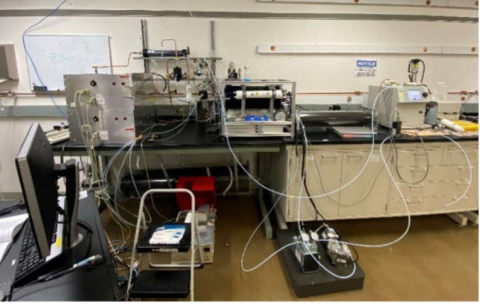
I started by learning the basics of different equipment used in the laboratory, such as a scanning mobility particle sizer (SMPS), condensation particle counter (CPC), and an oxidation flow reactor (OFR). I was taught to operate the devices and configure them to simulate a Decamethylcyclopentasiloxane (D5) experiment and analyze the data collected using the computer. I also learned the theory behind mass flow controllers, different types of flow meters, and permeation tubes, which I had only been exposed to in my classes. Over the summer, my lab partners and I experimented to simulate cVMS interactions in the environment. Later that summer, I had the opportunity to travel with the Stanier Lab group to UC Boulder to reproduce the experiments on a larger scale and compare results.
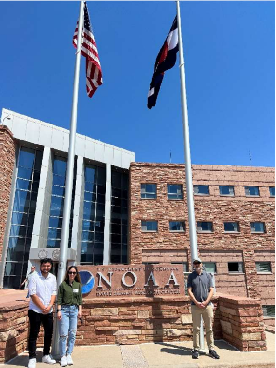
I also got to work with a National Oceanic Atmospheric Administration (NOAA) tall tower in West Branch, Iowa, that provides measurements of carbon dioxide (CO2) and related gases. I’m in charge of maintaining the facility and ensuring the computer system collects gas measurements properly. Every 14 days, I take a trip to the tall tower and change flasks to continue sampling gases, then I ship those flasks to the NOAA facility in Boulder, Colorado.
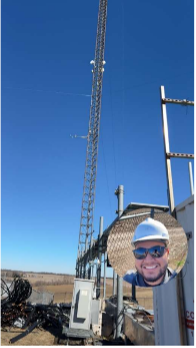
Carlos Gutierrez at the West Branch, Iowa tall tower for a regular flask change and leak check
I have excellent experience working under Dr. Charles Stanier and Ph.D. candidate Saeideh Mohammadi. I have learned a lot about the different applications of chemical engineering. I have also applied my knowledge from class to solve problems during the experiments. My communication skills have improved drastically since working in the lab due to the collaborative work that goes into it. As a result, working in the lab has made me a more complete chemical engineering student.
Global Congress on Process Safety
Olivia Clark
The winners of the 2023 Tinker Process Safety Competition were honored to represent the University of Iowa at the AIChE 2024 Spring Meeting and 20th Global Congress on Process Safety (GCPS). The GCPS was held from March 24th to 28th in New Orleans, Louisiana. Olivia Clark, Celesta Cox, Olivia Dohm, and Alejandro Lira—the 2023 competition winners—were accompanied by Professor Murhammer at the conference. The group listened to keynote speakers and attended sessions that addressed various aspects of process safety. The sessions on combustible dust were of high interest!
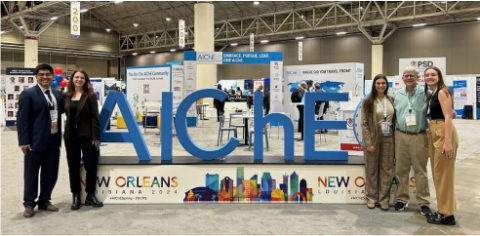
(l-r) Alejandro Lira, Olivia Clark, Celesta Cox, Professor Murhammer, Olivia Dohm.
The students were delighted to have another opportunity to present their posters from the Tinker Process Safety Competition, this time at the GCPS Poster Session. They shared their individual case studies on process safety disasters investigated by the Chemical Safety Board (CSB), spoke with engineers from industry who shared related information and anecdotes, and connected with several CSB investigators. The group enjoyed discussing their takeaways from the disasters and learning from attendees’ industrial experiences.

The 2023 winners would like to again extend their thanks to Sharon Tinker. Her competition provides such a unique and rewarding opportunity to deepen students’ understanding of chemical process safety. Furthermore, the students want to thank the CBE department for sponsoring the trip, as well as all who helped make the Tinker Process Safety Competition possible. The 2024 competition winners will have the chance to attend the 21st GCPS, scheduled for next spring in Dallas, Texas. Their attendance is highly encouraged!
Senior Class Future Plans
Josiah Power
Congratulations to our senior chemical engineering students who are graduating in the class of 2024! This year produced 39 graduates with a diverse array of undergraduate focus areas and future career paths. Most of our class has interests in consulting, process engineering, or graduate research. The following pie chart shows the breakdown of which industrial fields our seniors are planning to enter.
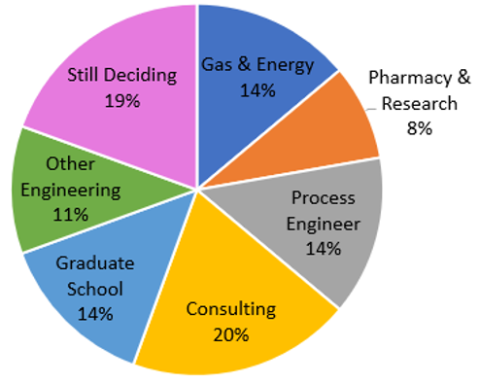
Future Career Paths of 2024 Chemical Engineering Graduates
My experience in chemical engineering as an undergraduate at Iowa has been very positive and rewarding. I've been given the opportunity to be a teaching assistant, research assistant, and master the course skills required for me to succeed in my future career. I'm excited to carry on my career as a graduate student at The Johns Hopkins University in chemical engineering, and I am excited to see where the accomplishments and positive changes our class will make in the world.

Acknowledgments
Thank you to the AIChE Officers for their hard work and contributing efforts to make our AIChE Student Chapter a successful organization!
President: Josiah Power
Vice President: Liam Horan
Secretary: Sydney Schulte
Treasurer: Cheryl Reuben
Newsletter Editor: Anna Stinson
Webmaster: Hallie Gates
Historian: Aoife Cleary
Social Chair: Caleb Coulthard
ChemE Car Chairs: Patrick Koehler and Joshua Santiago
K-12 Program Coordinators: Riley Coulter and Lacey Beck
Volunteer Chair: Vincent Hodges
Advisor: Professor David Murhammer
